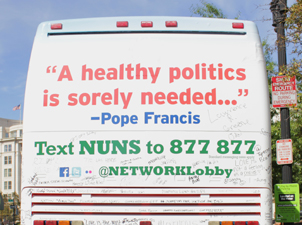
Commentary: Pope Francis’ Impact on the Catholic vote in 2016
By Simone Campbell, SSS
May 5, 2016
When the Bernie Sanders campaign announced plans to visit the Vatican, more than one journalist asked me for comment on the oddity of a progressive candidate seeking to associate himself with an institution whose views are antithetical to much of what he espouses. This, I believe, is a fundamental misunderstanding of how the majority of Catholics in America view the role of their faith in their political and civic life. Call it the Pope Francis effect. It is real and, because Catholics are the preeminent swing voters, it will matter a great deal.
In this, the first presidential election in the era of Pope Francis, attempts to control the “Catholic vote” through issues of personal sexuality – often nothing more than a crass political calculation – will no longer work as well, if at all. Instead, those who seek to divide our nation will find themselves up against a spiritual leader who has taken the teachings of our faith that have resided for many in the dusty tomes of Catholic scholarship and philosophy and made them breathing realities in our daily lives. In doing so, he has energized Catholics to embody the center of our faith – active concern for the common good and attention to the needs of those around us.
And then he has taken this sacred work a step further. The pope has reminded our elected leaders and all of us that individuals, churches, and communities, while vital to the work of taking care of each other, cannot be expected to do it all alone. The work of ending the vast disparities of wealth and opportunity in America and around the world can only be accomplished by implementation of policies on a grand scale, a political scale – a tax policy under which everyone and every corporation pays its fair share and all employers pay their workers a living wage; policies that encourage a “family-friendly workplace,” recognizing that the economy is at the service of workers, not the other way around.
This call has not been the least bit coy or veiled. In his speech before Congress in 2015, Francis told our elected officials, “You are called to defend and preserve the dignity of your fellow citizens in the tireless and demanding pursuit of the common good, for this is the chief aim of all politics. A political society endures when it seeks, as a vocation, to satisfy common needs by stimulating the growth of all of its members, especially those in situations of greater vulnerability or risk.”
The pope’s words have clearly broken through to the professional political class, though whether it is through their hearts as well as their talking points, I leave to others to decide. For proof, look at House Speaker Paul Ryan’s public apology for his past rhetoric blaming the poor for their own poverty. Were Ryan to also publicly recognize, for example, that his mea culpa did not go far enough, and that the full implementation of the Affordable Care Act and the expansion of Medicaid to those who are most vulnerable is a pro-life position, perhaps the transformation would be more believable.
Ultimately, though, Francis recognizes that politicians are essentially stand-ins for the rest of us. It is the electorate who must heed the call to become politically active. It is up to us to recognize that in the wealthiest nation the world has ever known, the fact that there is still a vast difference in life expectancy between the rich and the poor is a collective wrong that we have a moral obligation to make right.
Hence the pope’s repeated calls for Catholics to “meddle in politics,” his repeated calls to, yes, feed and house and meet basic human needs from our parishes, but also to go out into the world and call for, vote for, big change – a reformed immigration policy that recognizes and embraces the dignity of our brothers and sisters, regardless of where they happened to be born; national spending priorities that recognize the need for safe, affordable housing as greater than the excitement over a newer, faster, deadlier weapon of war.
While Catholics do not vote as a single bloc, they are nonetheless a renowned bellwether in the political world, having voted for the winner of the popular vote, with one exception, in every presidential election since Roosevelt.
This year will not be different. When the chattering class analyzes the “Catholic vote,” as it will inevitably do – both before and after the primary and general elections – it will find that in this year of mercy, our votes stretched far beyond our self-interest and to the common good, that we turned out and voted for the needs of those who are most often left out of our care. We will be called the “Pope Francis voters.”
Originally published in The Philadelphia Inquirer.








Even some non-Catholics I know consider themselves “Pope Francis voters!” Thanks for inspiring me to get back to reading Pope Francis’ encyclicals!